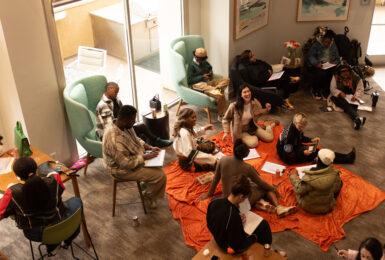
BeautyBusinessRadical Self Care
How Author Oludara Adeeyo Is Using Her Experience With Mistreatment At Work To Encourage Black Women To Prioritize Self-Care
When author and social worker Oludara Adeeyo began pursuing her degree in print journalism at Hofstra University, she was very clear about the career she intended to pursue. “I was determined to be a magazine editor,” she tells AFROPUNK. “I was a really big fangirl of Atoosa Rubenstein when she was editor of Seventeen and I really wanted to follow in her footsteps.”
She started with internships at some of the most coveted titles including Harper’s Bazaar, Marie Claire, and Teen Vogue before landing an assistant position at Cosmopolitan immediately after her graduation from undergrad in 2011. Adeeyo entered the workforce around the time when print publications were figuring out how to extend their presence online beyond simply sharing their print content. Towards that end, Cosmo brought in a digital editor who specialized in the kind of content that was gaining popularity online. Having been a huge fan, Adeeyo was initially excited to work with the editor – whose name she requested we omit.
“She just didn’t see how my presence fit there,” she recalls. “I’m pretty sure it was because I’m Black and I just didn’t fit her version of the Cosmo mold. Even though, by the time she got there, I had been there for two years.”
Suddenly, what had felt like a promising start to a long career became a toxic work environment. Adeeyo was often given more tasks that didn’t include writing, asked to pitch hundreds of ideas that were ignored, and given negative feedback about her performance without the guidance to improve to a senior editor level. She was even asked to support a newly hired assistant while that person became acclimated with their job.
When work becomes trauma…
“When I got hired at Cosmo, I had to hit the ground running because the person I was replacing was leaving that week,” she says. “I had to hit the ground running and learn, which is very common for Black women. There’s no real guidance, it’s like, ‘Oh, you can figure it out.’ And I didn’t just experience that at Cosmo, I experienced that everywhere.”
By the time she left the position, primarily to deal with the passing of her mother, Adeeyo had been pushed into hating the work she had always been so passionate about. She worked in PR for a few months before landing a position as a managing editor at XXL. And while she was no longer dealing with the microaggressions she faced at Cosmo, she was still working in a fast-paced, high-strung workplace. One day, during a tense meeting, she decided it was time to prioritize her wellness.
Her quest to find a new career led Adeeyo to decide to pursue a master’s in social work, but she was very intentional about seeking a path that would not become a new stressor. The Universe responded serendipitously with a program at the University of Southern California that was not only more unconventional in its admissions process but also offered her a scholarship. Relocating to Los Angeles after living on the East Coast her entire life was a welcomed change.
Coming Up For Air
“That’s when I began my self-care journey of really trying to understand who I am as a person and create the space to prioritize my wellness.”
That included therapy which helped her not only realize how traumatized she’d been by her time at Cosmo but also work through it.
In 2021, Adeeyo decided to return to the editorial world as a freelance book editor. Shortly thereafter, she was approached by Adams Media, an imprint of Simon & Schuster to develop her book “Self-Care For Black Women,” which was released on January 11, 2022. The book, “which she describes as “getting self-care advice from a loving friend or sister,” is a practical guide with actionable tips on how to practice self-care for the mind, body, and soul. “Overall, it’s about letting Black women know that they can just exist however they want to exist,” she adds.
“Healing isn’t always fun. It really is unlearning unhealthy habits and facing the hard ugly truth about yourself. I really had to look at my behavioral patterns and see where I was sabotaging my mind, body, and soul. As Black women, we’re made to feel like what we’re experiencing isn’t actually happening, which is exactly what gaslighting is. So it’s also about learning to trust your intuition.”
We asked Adeeyo, who hopes to one day transition into corporate wellness as a staff therapist, what advice she would offer young Black professionals as they enter the workforce:
- Be prepared for the politics: “Unfortunately, the workplace really does mimic White supremacy structures. Be aware of that.”
- Create boundaries between work and your personal life.
- Recognize when you’re being treated differently or being given more work and address it.
- Find people in your industry that whom you can connect. “Sometimes when you’re the only Black person in white spaces, you almost become protective of yourself. And you don’t realize that you’re shutting other Black people out. And you also don’t realize you’re being traumatized by your experience.”
- Eliminate self-doubt by not to internalize the negative aspects of your work
- Don’t feel like you need to stay at a job just because. You have option to leave.
Get The Latest
Signup for the AFROPUNK newsletter





